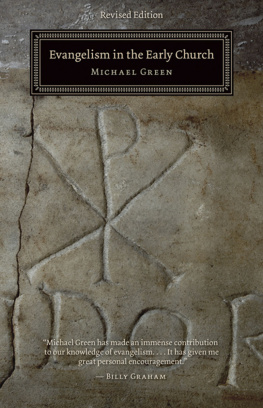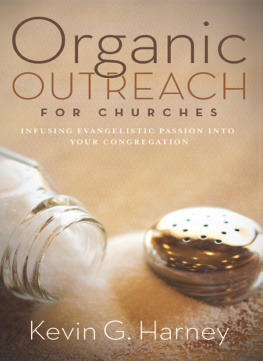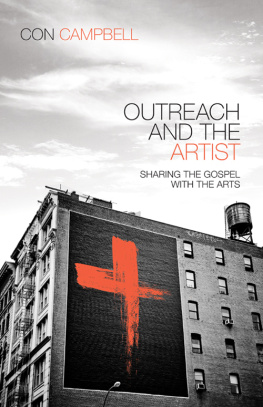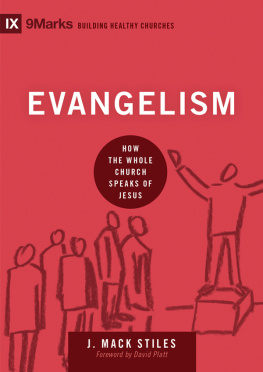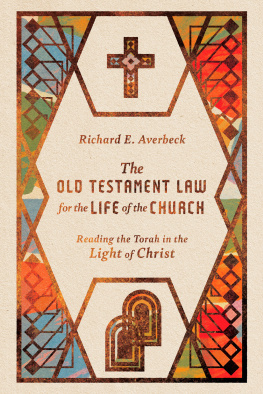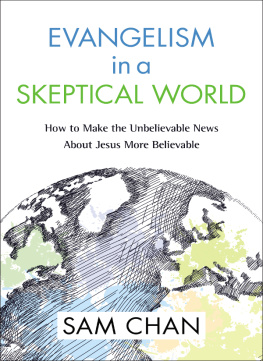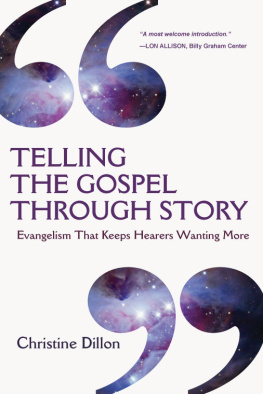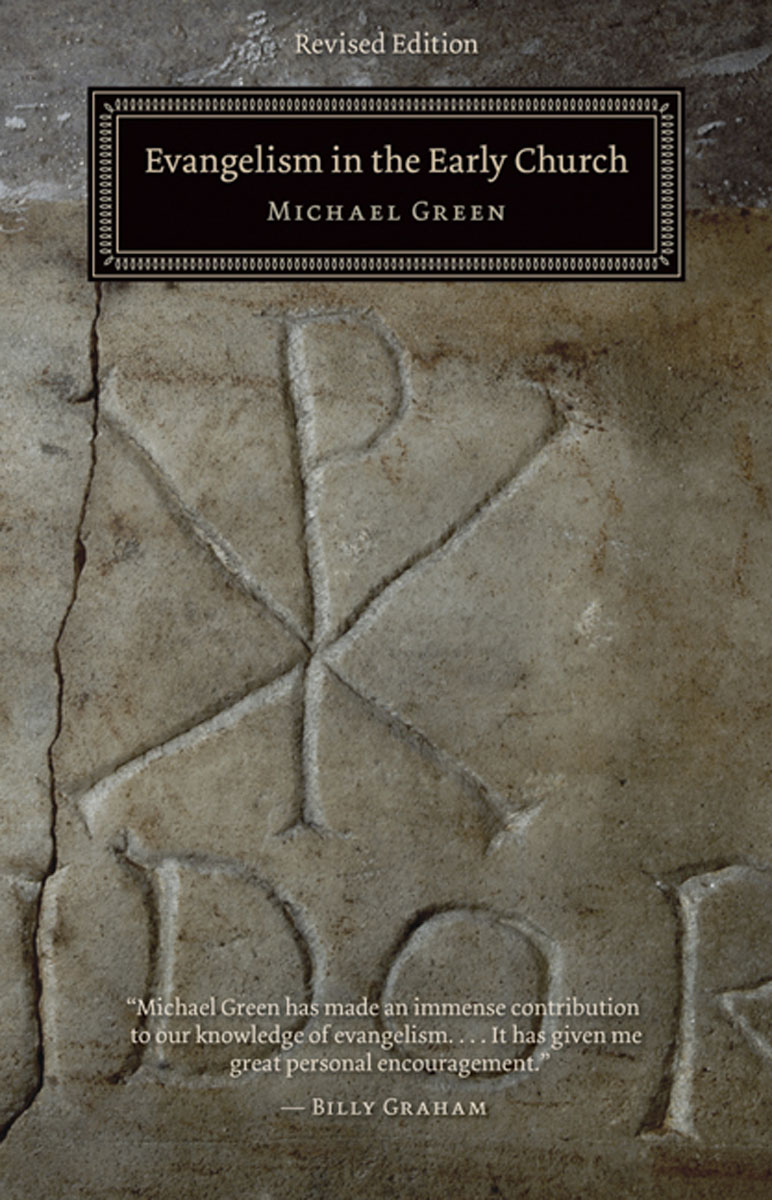

For Crispin and Gill Joynson-Hicks who, like the early Christians, use their home, their opportunities and their friendships to share with others the good news of Christ
Copyright Michael Green 1970, 2003
All rights reserved
First published 1970 in the United Kingdom by Hodder & Stoughton Revised edition published 2003 in the United Kingdom by Kingsway and 2004 in the United States of America by Wm. B. Eerdmans Publishing Company 2140 Oak Industrial Drive N.E., Grand Rapids, Michigan 49505 www.eerdmans.com
Printed in the United States of America
22 21 20 19 18 17 16 15 14 13 12 11 10 9
ISBN 978-0-8028-2768-5
Biblical quotations are from the Revised Standard Version 1946, 1952, 1971, 1973 by the Division of Christian Education and Ministry of the National Council of the Churches of Christ in the USA; and from the New English Bible The Delegates of the Oxford University Press and the Syndics of the Cambridge University Press 1961, 1970. Patristic citations are generally from the Ante Nicene Library or the Loeb Library.
Contents
Preface
There were two considerations which induced me to write this book. The first was that the whole subject of evangelism in the early Church had been unaccountably neglected in recent years. Nothing substantial had been written in English directly on this topic since Harnacks great book, The Mission and Expansion of Christianity, was translated in 1905. Harnack, though brilliant as a writer and encyclopaedic as a scholar, lived a long time ago. Our conception of the nature of the gospel has changed a good deal since the hey-day of Liberal Protestantism which he represented. Moreover, men like C. H. Dodd and Roland Allen have made significant contributions to different aspects of the subject. There seemed, therefore, to be room for a book which tried to reappraise some of the main aspects of evangelism in antiquity in the light of recent study, and to do some fresh research and thinking on the whole problem.
The second consideration was a more personal one. Most evangelists are not very interested in theology: most theologians are not very interested in evangelism. I am deeply committed to both. So the study of this subject was particularly congenial to me.
I have deliberately refrained from defining the scope of this study too precisely. It concentrates on the New Testament period both because of its normative importance for all subsequent evangelism, and also because it happens to be the sphere in which I am least ignorant. But I felt that it would be a mistake to leave the matter at the end of the New Testament period. I have, therefore, carried it through until about the middle of the third century, taking in roughly the 200 years stretching from St Paul to Origen. The book does not attempt to give an exhaustive or even chronological examination of the second or third century evidence: the treatment is topical and necessarily selective. I have, however, cited a good deal from the primary sources, in order to allow the men of the early Church to speak for themselves on the gospel and how it spread.
Neither do I make any attempt here to give a comprehensive account of the mission of the Church in the broad sense. This is ground which has been often and ably traversed. I have tried to stick closely to evangelism in the strict sense of proclaiming the good news of salvation to men and women with a view to their conversion to Christ and incorporation into his Church. There is, accordingly, little about pre-evangelism and the infiltration of pagan society by Christian influence and ideals; little on the social and political implications of the gospel; and little on the catechesis of the early Christians as they followed up their evangelistic outreach and consolidated the ground gained.
However, I believe that a study of evangelism even in this restricted sense is of real significance for our day. If it can help us to understand afresh the gospel these early Christians preached, the methods they employed, the spiritual characteristics they displayed, the extent to which they were prepared to think their message through in the light of contemporary thought forms, to proclaim it to the utmost of their power, to live it, and to die for it, then a study such as this might, perhaps, be of some service towards recalling the Church in our own day to her primary task.
I would like to take this opportunity of expressing my deep gratitude to the Council of the London College of Divinity for allowing me a sabbatical term in the summer of 1968, and to the Tyndale Fellowship for Biblical Research for allowing me free residence, during that term, at Tyndale House Library, Cambridge, whose Librarian, Mr Alan Millard, was willing to lay his own work aside whenever necessary in order to help others. I am very grateful to Dr J. M. C. Toynbee and Professor H. E. W. Turner for their help with different aspects of the book. I owe more than I can acknowledge to Dr Dacre Balsdon, of Exeter College, Oxford, and to Dr Henry Chadwick, then of Queens College, Cambridge, who respectively gave their pupil a love for the classics and theology. I am particularly grateful to the latter, and to Professor Maurice Wiles, of London, for reading through the original manuscript and making many helpful suggestions and corrections. I want to thank two colleagues, Mr Stephen Travis and Mr Franklyn Dulley, for their help, together with Dr Timothy Mimpriss and Mr Grahame Humphries for assistance with the tedious task of indexing. The efficiency of my secretary Judith Berrill and the long suffering of my wife and children provided enormous support during a particularly busy period preparing for the Colleges move to Nottingham in 1970. And I am thankful to the students of many universities in this country and overseas for driving me, through the challenge of leading university missions, to get back to first principles and examine afresh the bearing of evangelism in the early Church on the task of making Christ known today.
E. M. B. Green
The London College of Divinity
September 1969
Introduction to the Revised Edition
Much has happened in the thirty years since this book was first published. There has been a substantial shrinkage of the Church in the West, matched by its meteoric expansion in Latin America, Africa and South-East Asia, together with similar advance in Eastern Europe and especially China. In the academic sphere, New Testament and patristic scholarship has advanced, but its status in the prevailingly secularized atmosphere of Western universities has diminished. There have been considerable changes in lifestyle, particularly in attitudes to material possessions. Furthermore there has been a massive slide in public morality, and today we witness the absence of great causes for which people are prepared to sacrifice.
A changed climate
Perhaps the most substantial difference in the cultural sphere is the development of existentialism (so influential for the first twenty years after World War Two) into the current post-modernism and deconstructionism. The modern world which has prevailed since the Enlightenment with its cardinal principle of radical doubt, its broad rejection of the supernatural, its elevation of rationalism, its empiricism and its conviction that human nature is basically good is on the way out. This is not the place to discuss the reasons: the facts are plain. And disenchantment with this pattern of perceiving our world has led to a postmodern understanding, which places far less emphasis on the omnicompetence of reason and opens the door for personal insights and the possibility both of the supernatural and the occult. It embraces alternative medicine, is strong on celebration of life, is passionately concerned about our environment, and is persuaded that we must deconstruct all ideas of objectivity in history, science and philosophy, and cultivate an attitude of radical openness to insights and impressions from whatever quarter. Structures are out: perceptions are in, and they must all be respected. Relativism in morals and pluralism in belief are all part of this newer worldview, which is hard to categorize precisely but has percolated very fast throughout society.
Next page
